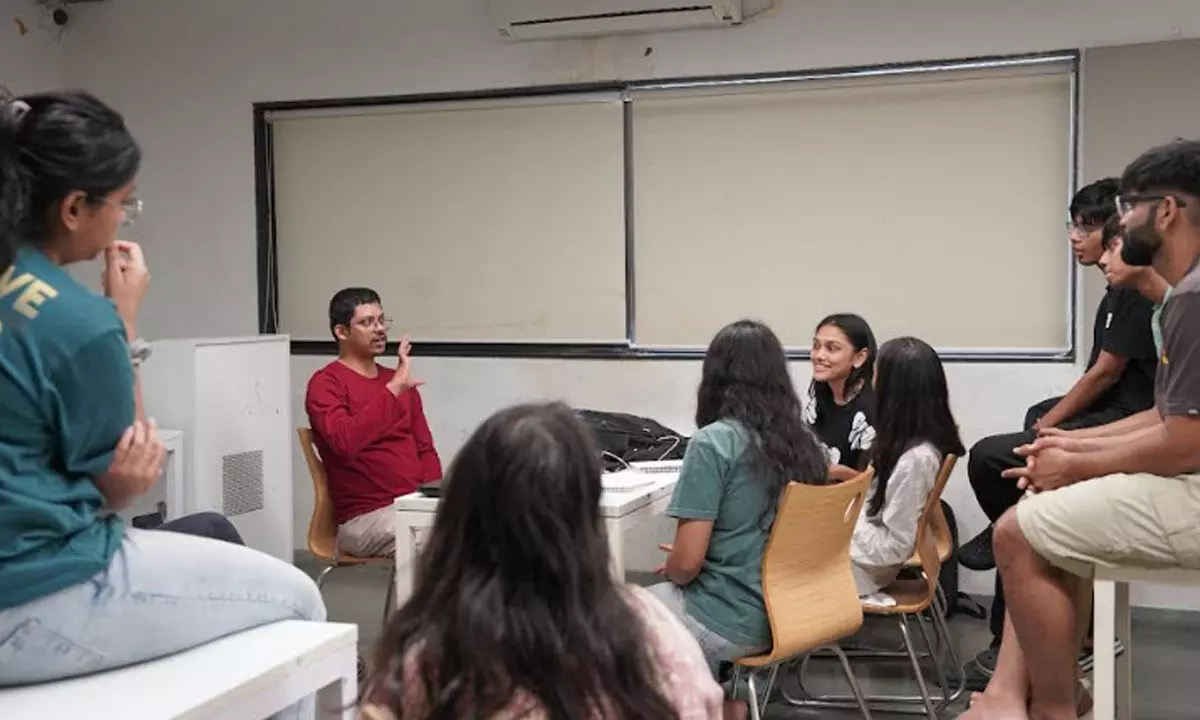Live
- Nizamabad MP Dharmapuri Arvind and Jagtial MLA Dr. Sanjay Kumar Meet CM Revanth Reddy
- Hyderabad CP CV Anand Issues Stern Warning to Bouncers
- MP Laxman Criticizes Police Conduct, Calls for Support for Victims' Families
- Fire Breaks Out in Kachiguda-Chennai Egmore Express, Passengers Evacuated Safely
- CM Revanth Reddy Condemns Attacks on Film Personalities' Homes, Calls for Strict Action
- Victory Venkatesh and Nandamuri Balakrishna to Set Screens on Fire with Unstoppable Season 4
- Over 71.81 crore Ayushman Bharat Health Account numbers generated: Centre
- In special gesture, Kuwait's Prime Minister sees-off PM Modi at airport after conclusion of historic visit
- Veer crowned PGTI Ranking champion, Shaurya wins emerging player honour
- Sr National Badminton: Unseeded Rounak Chauhan, Adarshini Shri reach singles semis
Just In
Kisse Kahaniyaan workshop for students held


Anant National University’s design week ‘IDEA: International Designers Explore / Experiment / Educate’ at Anant, delved into the complexities of identity in an increasingly homogenised global culture under the theme ‘Rediscovering Roots’.
Anant National University’s design week ‘IDEA: International Designers Explore / Experiment / Educate’ at Anant, delved into the complexities of identity in an increasingly homogenised global culture under the theme ‘Rediscovering Roots’.
Shashank Nimkar, a guest instructor for IDEA and founder and CEO of Earth Tatva offered the workshop Kisse Kahaniyan to Anant students. To understand the journey of India’s systems to source, consume and celebrate the offerings by nature and dive deeper into the socio-cultural influence on practices across regions this course initiated an inquiry through a fun approach of role play, from ancient times to the modern lifestyle.
The workshop took students on a journey to rediscover for themselves what was it to live in the world of their ancestors; what objects, values and habits were passed down to the next generation, how cultural nuances led the decision making; and the position of these social elements to identify patterns of change in the 21st century.
During most educational efforts students are told what happened in the past and what could be done to make an intervention, this factual stimulus may sometimes disconnect students from their innate curiosities limiting their explorations, scope of creativity and passion about the subject under discussion. To break away from such a conventional approach IDEA offered a fertile experimental opportunity for Shashank to pave a path for the students to find for themselves about our shared past by having direct interactions with their grandparents, parents, friends, neighbours and any possible acquaintance. This approach helped the students to conduct primary research by having fun conversations and delve deeper into their memory to find similar experiences and events they witnessed over the years of their social interactions. It also sensitized them towards the need for a circular design approach through their own realization of change over years rather than branding a course to emphasize on sustainability.
The workshop was based on the premise that with the advent of technology we have garnered much knowledge about the happenings worldwide and have a fair understanding of cultures that have inspired creation of content on social media and OTT platforms. Perhaps most of the rituals practised today are influenced by the mainstream media and have become a part of cultural events as a trend to be followed. Such widespread generic inspiration for cultural events as intimate as a wedding have made us experience the same games, rituals and other interactions across weddings at different parts of India that we have attended over the past few years.
When exploring India’s traditional practices it is impossible to not pay attention to how each material and its derived product was used thoroughly to its fullest value; As against our present day experience of single-use materials for decoration, food consumption, invitation and many other aspects of weddings.
To confirm this hypothesis, weddings were chosen as a topic to be studied across three centuries – 1800s, 1900s and the present day – in different Indian states. This helped the students to explore and touch upon various elements involved, like – food, costumes, customs & rituals, social interactions, gifts, ambience & decoration, music, among others.
The students not just gathered kisse kahaniyaan from weddings of different eras and cultures from their family and friends but also created live action short films depicting these anecdotes with their own creative touch.
Some interesting experiences came across by students included – traditionally rice grains were tied in a handkerchief to be gifted to a guest while verbally inviting them for a wedding in Rajasthan, today in Bengali weddings younger generations are seen indulging in juta churai as against traditionally demanding gifts from groom to enter the bride’s room after the wedding, in Kerala, the present day groom is also seen touching the bride’s feet to signify equality.
This approach was a successful experiment that enabled the students to experience different situations first hand through a role-play, learn and implement the art and craft of filmmaking, enhance their capabilities for team work and of course a whole new way to conduct research that can be applied for any of their future projects.
The workshop did not end here. Based on their learnings from making the short films, the students individually identified gaps in the current wedding industry – for various stakeholders. Each student came up with a social innovation project to solve these market gaps through their interventions; ranging from an all information guide to know the respective customs in different cultures that also enables renting of props to an app that enables guest management to reduce food and other resource wastage during weddings. Some of these solutions have a high potential to be turned into start-ups that benefit various stakeholders of the wedding industry and accelerate India’s journey to achieve a circular economy while aligning to cultural interests.
By Shashank Nimkar, Founder, Earth Tatva

© 2024 Hyderabad Media House Limited/The Hans India. All rights reserved. Powered by hocalwire.com






